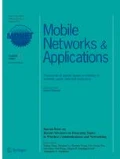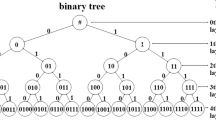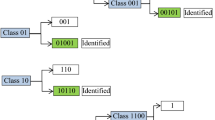Abstract
In the RFID system, a reader recognizes tags through communications over a shared wireless channel. When multiple tags transmit their IDs at the same time, the tag-to-reader signals lead to collision. Tag collision arbitration for passive RFID tags is significant for fast identification since collisions disturb the reader's identification process. This paper presents an Adaptive Binary Splitting (ABS) protocol which is an improvement on the binary tree protocol. To reduce collisions and identify tags efficiently, ABS uses information which is obtained from the last processes of tag identification. Our performance evaluation shows that ABS outperforms other tree based tag anti-collision protocols.
Similar content being viewed by others
References
Draft protocol specification for a 900 MHz Class 0 Radio Frequency Identification Tag. Auto-ID Center, Feb. 2003.
Engels, D. W., & Sarma, S. E. (2002, October) The reader collision problem. In Proceedings of IEEE International Conference on System, Man and Cybernetics, Hammamet, Tunisie.
EPC™ Radio-Frequency Identification Protocols Class-1 Generation-2 UHF RFID Protocol for Communications at 860MHz–960MHz Version 1.0.8, EPCglobal, Dec. 2004.
Hush, D. R., & Wood, C. (1998) Analysis of tree algorithms for RFID arbitration. In Proceedings of IEEE International Symposium on Information Theory, pp. 107.
Information technology automatic identification and data capture techniques—Radio frequency identification for item management Air interface. Part 6. Parameters for Air interface communications at 860–960 MHZ, Final Draft International Standard ISO 18000-6, Nov. 2003.
Jacomet, M., Ehrsam, A., & Gehrig, U. (1999, July) Contactless identification device with anticollision algorithm. In Proceedings of IEEE Conference on Circuits, System, Computers and Communications (pp. 269–273). Athens, Greece.
Law, C., Lee, K., & Siu, K.-Y. (2000, August) Efficient memoryless protocol for tag identification. In Proceedings of the 4th International Workshop on Discrete Algorithms and Methods for Mobile Computing and Communications (pp. 75–84). Boston, Massachusetts.
Myung, J., & Lee, W. (2005, March) An adaptive memoryless tag anti-collision protocol for RFID networks, IEEE conference on computer communications (INFOCOM-2005). Poster Session, Miami, Florida.
Sarma, S., Brock, D., & Engels, D. (2001, November) Radio frequency identification and the electronic product code. IEEE Micro, 21(6), 50–54.
Scharfeld, T. A. (2001, November) An analysis of the fundamental constraints on low cost passive radio-frequency identification system design, M.S. thesis, Massachusetts Institute of Technology, pp. 92–100.
Vogt, H. (2002, April) Efficient object identification with passive RFID tags. In Proceeds of the International Conference on Pervasive computing (pp. 98–113).
Waldrop, J., Engels, D. W., & Sarma, S. E. (2003, May) Colorwave: an anticollision algorithm for the reader collision. In proceedings of IEEE International Conference on Communications (ICC), Anchorage, Alaska.
Zhou, F., Chen, C., Jin, D., Huang, C., & Min, H. (2004, August) Evaluating and optimizing power consumption of anti-collision protocols for applications in RFID systems. In Proceedings of the International Symposium on Low Power Electronics and Design, Newport Beach, California.
Author information
Authors and Affiliations
Corresponding author
Additional information
This work was supported by Korea Research Foundation Grant (KRF-2005-041-D00680).
Rights and permissions
About this article
Cite this article
Myung, J., Lee, W. Adaptive Binary Splitting: A RFID Tag Collision Arbitration Protocol for Tag Identification. Mobile Netw Appl 11, 711–722 (2006). https://doi.org/10.1007/s11036-006-7797-6
Published:
Issue Date:
DOI: https://doi.org/10.1007/s11036-006-7797-6




